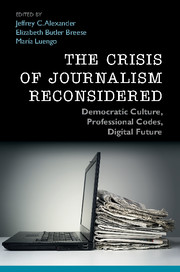Book contents
- Frontmatter
- Dedication
- Contents
- About the Contributors
- Preface
- Acknowledgments
- Introduction: Journalism, democratic culture, and creative reconstruction
- PART I THE CRISIS NARRATIVE
- PART II FEARS OF DIGITAL NEWS MEDIA: THE SYMBOLIC STRUGGLE
- PART III PROFESSIONAL JOURNALISM, CIVIL CODES, AND DIGITAL CULTURE
- Conclusion: News innovations and enduring commitments
- Index
Preface
Published online by Cambridge University Press: 05 June 2016
- Frontmatter
- Dedication
- Contents
- About the Contributors
- Preface
- Acknowledgments
- Introduction: Journalism, democratic culture, and creative reconstruction
- PART I THE CRISIS NARRATIVE
- PART II FEARS OF DIGITAL NEWS MEDIA: THE SYMBOLIC STRUGGLE
- PART III PROFESSIONAL JOURNALISM, CIVIL CODES, AND DIGITAL CULTURE
- Conclusion: News innovations and enduring commitments
- Index
Summary
In recent decades, there has been an unfortunate split between core social sciences and media studies. While journalism has virtually disappeared from the agenda of academic sociology, a massive new discipline has emerged around mass communication, sporting its own journals, paradigms, global meetings, and graduate schools. Tens of thousands of teachers and students in this new global discipline certainly constitute a potentially huge audience for innovative contributions to the field. But an inward-looking quality to debates in “media studies” makes much of its scholarly activity orthogonal to social theorizing and empirical sociology in their contemporary forms. The challenge for contemporary sociology is to find a way of speaking to the crisis of contemporary journalism in a language that is relevant to the vast and still-expanding discipline of media studies.
The Crisis of Journalism Reconsidered aims to accomplish this feat by speaking in two languages – the widely understood language of fundamental social theory/sociology, on the one hand, and the discourse of “disciplinary journalism,” on the other. The authors in this book are trained in sociology departments or in the handful of sociologically-oriented journalism schools, such as the Columbia School of Journalism, and most are housed in departments of journalism inside schools of media studies. Among such rare two-legged creatures, we have selected those most sophisticated in contemporary social theory and empirically based social science. Our volume's master theme addresses a contemporary crisis to which every media student is attuned, but does so in a theoretical manner that bridges social science and media studies.
Among both the popular and academic media-studies books that address the current crisis in journalism, explanations have been one-sidedly focused on technology and economics – and, as a result, decidedly gloomy in their predictions: Meyer, The Vanishing Newspaper: Saving Journalism in the Information Age (University of Missouri Press, 2009, 2nd edition); Jones, Losing the News: The Future of the News that Feeds Democracy (Oxford: Oxford University Press, 2009); Mersey, Can Journalism be Saved? Rediscovering America's Appetite for News (Santa Barbara: Praeger, 2010); and McChesney and Pickard, Will the Last Reporter Please Turn Out the Lights: The Collapse of Journalism and What Can Be Done to Fix It (New York: The New Press, 2011).
- Type
- Chapter
- Information
- The Crisis of Journalism ReconsideredDemocratic Culture, Professional Codes, Digital Future, pp. xiii - xviPublisher: Cambridge University PressPrint publication year: 2016

